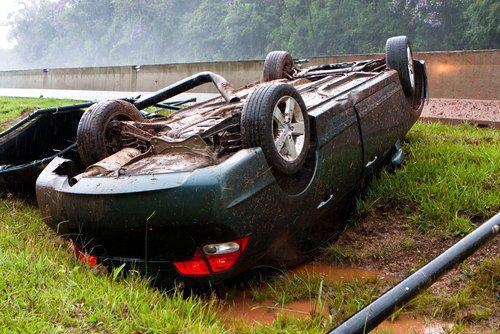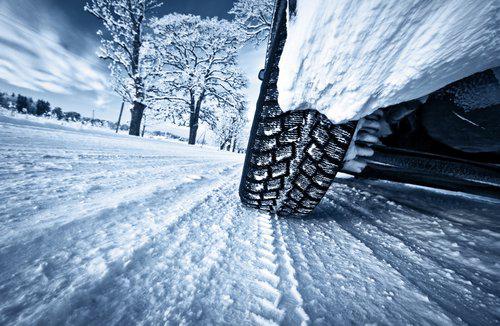Recent Blog Posts
Preparing for Wisconsin Winter Driving
 Traffic accidents occur for a number of reasons. Distracted driving, impaired driving, and violation of traffic laws typically top the list of most common causes of accidents. Last year, the Wisconsin Department of Transportation reported nearly 120,000 motor vehicle crasheswith approximately 21,000 of them being speed-related and approximately 5,000 being alcohol-related.
Traffic accidents occur for a number of reasons. Distracted driving, impaired driving, and violation of traffic laws typically top the list of most common causes of accidents. Last year, the Wisconsin Department of Transportation reported nearly 120,000 motor vehicle crasheswith approximately 21,000 of them being speed-related and approximately 5,000 being alcohol-related.
However, there are other factors that affect drivers’ safety on the road such as weather conditions. It is not uncommon for Milwaukee drivers to experience harsh winter weather including cumulative snowfall of more than 60 inches per year.
Those native to Wisconsin may already be aware of what to do to winterize their vehicles, but it is important to keep these winter tips in mind to ensure safer driving during the colder months:
Uber Driver Liability in Personal Injury Cases
 Over the last few years, the driving service, Uber, has grown tremendously. The number of new drivers has practically doubled every six months, and on any given day, at least 150,000 drivers log trips in the company’s system. In many ways, it has had a positive impact on America by reducing the number of drunk drivers on the road while providing average people with an easy way to make extra cash. Yet, despite its benefits, this rapidly growing business continues to spark some pretty serious questions regarding liability and personal injury.
Over the last few years, the driving service, Uber, has grown tremendously. The number of new drivers has practically doubled every six months, and on any given day, at least 150,000 drivers log trips in the company’s system. In many ways, it has had a positive impact on America by reducing the number of drunk drivers on the road while providing average people with an easy way to make extra cash. Yet, despite its benefits, this rapidly growing business continues to spark some pretty serious questions regarding liability and personal injury.
Assaults on Drivers
Afraid that they may be at risk because of intoxicated or violent passengers, many Uber drivers have begun to record their trips, not just to reduce their own risk of complaints from riders, but to ensure they have evidence if they are assaulted. In one recent case, a California Uber driver claims to have been assaulted by a former Taco Bell employee.
Wisconsin Interstate Accident Rates Increase with Speed Limit
 Across the United States, speed limits on national interstates have been increasing. Wisconsin — the last upper Midwest state to up the maximum speed limit to 70 miles per hour — began to implement their increases back in mid-June. Over a four month period, there have been five more vehicle accident fatalities than there were over the same time period last year, and each month the accident rate was nearly 13% higher than the previous year. Officials are concerned about the implications, especially since we are now headed into colder months with potentially poorer driving conditions.
Across the United States, speed limits on national interstates have been increasing. Wisconsin — the last upper Midwest state to up the maximum speed limit to 70 miles per hour — began to implement their increases back in mid-June. Over a four month period, there have been five more vehicle accident fatalities than there were over the same time period last year, and each month the accident rate was nearly 13% higher than the previous year. Officials are concerned about the implications, especially since we are now headed into colder months with potentially poorer driving conditions.
Reason for the Uptick in Accidents Unknown
Although it is easy to blame the increase in the number of accidents on the new speed limit, officials admit that they do not know the real reason behind it. It could be that drivers are still adjusting to the increased speed limit, or that some drivers may still be traveling at slower speeds and inadvertently creating more risk for an accident. There is also the possibility that other factors, such as distracted driving, have a role in the increase in accidents.
Smartphones Suspected in Massive Spike of Motor Vehicle Fatalities
 Experts believe that the recent spike in motor vehicle accidents and fatalities goes beyond what would be reasonable if it were simply a matter of more drivers on the road; they say smartphones may be largely responsible.
Experts believe that the recent spike in motor vehicle accidents and fatalities goes beyond what would be reasonable if it were simply a matter of more drivers on the road; they say smartphones may be largely responsible.
Road Fatalities More than Double the Expected Increase
According to preliminary government statistics, national motor vehicle death rates rose to 16,225 from January 2015 to June 2015. Experts from the National Highway Traffic Safety Administration say this is more than double the increase expected from the variables of falling gas prices and a growing, improving economy. It is also the biggest six-month jump in reported traffic deaths since 1977.
Officials Examining Possible Causes
While officials say it is too early to identify the true causes behind the spike in motor vehicle fatalities, they are investigating some possibilities. For example, they say that teen drivers (and other risky drivers) may be on the road more often because of lower gas prices, which could be at least partially responsible for the increase in fatalities. But distracted driving — or the use of electronics devices such as smartphones — is the most suspected cause.
Safe Winter Weather Driving and Wildlife-Related Accidents
 In winter, deer and other types of wildlife become more prominent on the roads. As a result, wildlife-related accidents increase. One recent case, which involved two vehicles and a deer in Georgia, caused the death of an 11-year-old child. Sadly, it is far too common of an issue.
In winter, deer and other types of wildlife become more prominent on the roads. As a result, wildlife-related accidents increase. One recent case, which involved two vehicles and a deer in Georgia, caused the death of an 11-year-old child. Sadly, it is far too common of an issue.
Wildlife-Related Accident Statistics
According to the Division of Motor Vehicles (DMV), one in 17 cars is involved in an accident with wandering wildlife — about one every 39 minutes. The majority of those collisions occur on two lane roads, much like the one that recently took place in Georgia. Approximately 200 motorists are killed each year because of an accident involving wandering wildlife.
Reducing Your Risk
While not every wildlife-related accident can be prevented, the following tips can help you reduce your overall risk:
Wisconsin’s DOT Releases 2015 Accident Statistics
 Each November, the Department of Transportation releases preliminary information on the state’s automobile accidents and fatalities. Sadly, it appears that there were more injuries and fatalities in 2015 than 2013 and 2014. This was also an increase in alcohol-related injuries and fatalities, which were both higher than the previous four years.
General 2015 Accident and Collision Statistics
According to preliminary results, there were 111,791 total accidents and collisions in 2015. Of those, 82,191 resulted in property damage and 29,036 resulted in injury. There were also 509 total fatalities. These death and injury rates are higher than both 2014, in which there 451 fatalities and 28,801 injuries, and 2013, in which there were 491 fatalities and 28,474 injuries. Overall fatality rate increased by .11 percent from the previous year (0.89 percent in 2014 compared to 1 percent in 2015).
Alcohol-Related Crashes
With a total of 5,491 crashes in 2015, drunk driving accidents were significantly higher in 2015 than in the previous four years (4,932 in 2014; 4,954 in 2013; 5,024 in 2012; and 5,297 in 2011).
A total of 218 fatalities and 3,171 injuries occurred because of drunk driving accidents in 2015. These, too, were higher than in previous years (162 fatalities and 2,694 injuries in 2014; 185 fatalities and 2,660 injuries in 2013; 2,907 injuries in 2012, and 2,984 injuries in 2011). However, the fatalities from drunk driving accidents in 2011 and 2012 were higher than in 2015 (225 and 223, respectively).
Speed-Related Crashes
In all, Wisconsin saw 18,389 speed-related accidents, which caused 7,828 injuries and 167 fatalities. Overall, there were fewer crashes than in the previous two years (20,887 in 2014 and 21,290 in 2013). However, more fatalities were attributed to speed-related crashes in 2015 (163 in 2014 and 156 in 2013).
Motorcycle Crashes
For motorcyclists, 2015 proved to be a more dangerous than the previous two years, with 2,376 total crashes, 91 fatalities, and 2,161 injuries. These rates are compared to 2,101 accidents, 67 fatalities, and 1,914 injuries in 2014, and 2,150 crashes, 83 fatalities, and 1,927 injuries in 2013.
Pedestrian and Bicycle Accidents
Pedestrians were involved in more crashes in 2015 than in 2014 (1,244 versus 1,183). They also experienced more injuries (1,244 in 2015 compared to 1,119 in 2014) and fatalities (45 in 2015 compared to 42 in 2014) than in the previous year.
Bicycle accidents were also higher for 2015 than the year, with 1,055 accidents in 2015 (compared to 925 in 2014). Fatalities (10 versus 4) and injuries (976 versus 844) were also higher for 2015 when compared to 2014 bicycle accident rates.
Involved in an Accident? Seek Representation with a Skilled Accident Attorney
There are likely a number of factors have contributed to the overall increase in accidents during 2015, however, regular, everyday, working individuals are still in pain, receiving medical care, missing work, or no longer alive because of these accidents. If you or someone you love happened to be one of them, you may be entitled to compensation.
The skilled Milwaukee automobile accident attorneys at Gimbel, Reilly, Guerin & Brown, LLP, can help. Dedicated to serving the needs and best interest of automobile accident victims, they can ensure your rights are protected and will thoroughly investigate your situation to build a strong case. To find out more, call 414-271-1440 and schedule your consultation today.
Each November, the Department of Transportation releases preliminary information on the state’s automobile accidents and fatalities. Sadly, it appears that there were more injuries and fatalities in 2015 than 2013 and 2014. This was also an increase in alcohol-related injuries and fatalities, which were both higher than the previous four years.
General 2015 Accident and Collision Statistics
According to preliminary results, there were 111,791 total accidents and collisions in 2015. Of those, 82,191 resulted in property damage and 29,036 resulted in injury. There were also 509 total fatalities. These death and injury rates are higher than both 2014, in which there 451 fatalities and 28,801 injuries, and 2013, in which there were 491 fatalities and 28,474 injuries. Overall fatality rate increased by .11 percent from the previous year (0.89 percent in 2014 compared to 1 percent in 2015).
Alcohol-Related Crashes
With a total of 5,491 crashes in 2015, drunk driving accidents were significantly higher in 2015 than in the previous four years (4,932 in 2014; 4,954 in 2013; 5,024 in 2012; and 5,297 in 2011).
A total of 218 fatalities and 3,171 injuries occurred because of drunk driving accidents in 2015. These, too, were higher than in previous years (162 fatalities and 2,694 injuries in 2014; 185 fatalities and 2,660 injuries in 2013; 2,907 injuries in 2012, and 2,984 injuries in 2011). However, the fatalities from drunk driving accidents in 2011 and 2012 were higher than in 2015 (225 and 223, respectively).
Speed-Related Crashes
In all, Wisconsin saw 18,389 speed-related accidents, which caused 7,828 injuries and 167 fatalities. Overall, there were fewer crashes than in the previous two years (20,887 in 2014 and 21,290 in 2013). However, more fatalities were attributed to speed-related crashes in 2015 (163 in 2014 and 156 in 2013).
Motorcycle Crashes
For motorcyclists, 2015 proved to be a more dangerous than the previous two years, with 2,376 total crashes, 91 fatalities, and 2,161 injuries. These rates are compared to 2,101 accidents, 67 fatalities, and 1,914 injuries in 2014, and 2,150 crashes, 83 fatalities, and 1,927 injuries in 2013.
Pedestrian and Bicycle Accidents
Pedestrians were involved in more crashes in 2015 than in 2014 (1,244 versus 1,183). They also experienced more injuries (1,244 in 2015 compared to 1,119 in 2014) and fatalities (45 in 2015 compared to 42 in 2014) than in the previous year.
Bicycle accidents were also higher for 2015 than the year, with 1,055 accidents in 2015 (compared to 925 in 2014). Fatalities (10 versus 4) and injuries (976 versus 844) were also higher for 2015 when compared to 2014 bicycle accident rates.
Involved in an Accident? Seek Representation with a Skilled Accident Attorney
There are likely a number of factors have contributed to the overall increase in accidents during 2015, however, regular, everyday, working individuals are still in pain, receiving medical care, missing work, or no longer alive because of these accidents. If you or someone you love happened to be one of them, you may be entitled to compensation.
The skilled Milwaukee automobile accident attorneys at Gimbel, Reilly, Guerin & Brown, LLP, can help. Dedicated to serving the needs and best interest of automobile accident victims, they can ensure your rights are protected and will thoroughly investigate your situation to build a strong case. To find out more, call 414-271-1440 and schedule your consultation today.
Source:
Accident Liability: Case Highlights What Not to Do after an Auto Accident
 Automobile accidents happen every day, and every day, well-meaning individuals make poor decisions that could cost them in their case. An argument between a North Carolina senator and another driver highlights some of the biggest — and the most common—mistakes.
Apologizing and Accepting Blame
Immediately after the accident, the senator allegedly apologized to the other driver, saying he did not see her as he was pulling out of a parking space. Afterwards, he attempted to retract his apology in an email to the local news company. In it, he expressed that he had only wished to resolve the matter, but that he had always felt as though the other driver had been at fault for the accident. Unfortunately, the damage to his reputation had already been done.
Lesson: Don’t focus on “blame” after an accident. Make sure all parties are physically okay, including yourself.
Accepting a Good Faith Arrangement
Because he allegedly wanted to resolve the matter quickly and easily, the senator reportedly gave a good faith statement to the other driver, offering to pay for the damages to her vehicle. As a result, the responding officer did not investigate the accident any further. This created a problem for the other driver when, after being denied payment from the senator, she attempted to file a claim against his insurance. The entire incident became a matter of her word against his.
Lesson: Do not enter a good faith arrangement with a complete stranger, regardless of the situation.
Failing to File a Claim
Because they had entered into a good faith arrangement, the other driver agreed not to file a claim with the senator’s insurance. Unfortunately, he never held up his end of the deal, and by the time she went to file the claim, it had been nearly a month since the accident. There was no real evidence, outside of the photos the senator allegedly took, and the police did not investigate blame. The other driver now only had the choice of paying out of pocket to cover the damages, or filing against her own insurance. Thankfully, it does not appear that she suffered any accident-related injuries.
Lesson: If you are in an accident, contact both insurance companies immediately, or contact a personal injury attorney to advise you.
Injured in an Automobile Accident? Hire a Skilled Personal Injury Attorney
You may be entitled to compensation if you or someone you love has been injured in an accident. However, because these cases are often complex, it is crucial that you contact a skilled Milwaukee automobile accident attorney as soon as possible. At Gimbel, Reilly, Guerin & Brown, LLP, we are dedicated to providing aggressive and compassionate representation for accident victims. Contact our offices at 414-271-1440 today to schedule your consultation.
Automobile accidents happen every day, and every day, well-meaning individuals make poor decisions that could cost them in their case. An argument between a North Carolina senator and another driver highlights some of the biggest — and the most common—mistakes.
Apologizing and Accepting Blame
Immediately after the accident, the senator allegedly apologized to the other driver, saying he did not see her as he was pulling out of a parking space. Afterwards, he attempted to retract his apology in an email to the local news company. In it, he expressed that he had only wished to resolve the matter, but that he had always felt as though the other driver had been at fault for the accident. Unfortunately, the damage to his reputation had already been done.
Lesson: Don’t focus on “blame” after an accident. Make sure all parties are physically okay, including yourself.
Accepting a Good Faith Arrangement
Because he allegedly wanted to resolve the matter quickly and easily, the senator reportedly gave a good faith statement to the other driver, offering to pay for the damages to her vehicle. As a result, the responding officer did not investigate the accident any further. This created a problem for the other driver when, after being denied payment from the senator, she attempted to file a claim against his insurance. The entire incident became a matter of her word against his.
Lesson: Do not enter a good faith arrangement with a complete stranger, regardless of the situation.
Failing to File a Claim
Because they had entered into a good faith arrangement, the other driver agreed not to file a claim with the senator’s insurance. Unfortunately, he never held up his end of the deal, and by the time she went to file the claim, it had been nearly a month since the accident. There was no real evidence, outside of the photos the senator allegedly took, and the police did not investigate blame. The other driver now only had the choice of paying out of pocket to cover the damages, or filing against her own insurance. Thankfully, it does not appear that she suffered any accident-related injuries.
Lesson: If you are in an accident, contact both insurance companies immediately, or contact a personal injury attorney to advise you.
Injured in an Automobile Accident? Hire a Skilled Personal Injury Attorney
You may be entitled to compensation if you or someone you love has been injured in an accident. However, because these cases are often complex, it is crucial that you contact a skilled Milwaukee automobile accident attorney as soon as possible. At Gimbel, Reilly, Guerin & Brown, LLP, we are dedicated to providing aggressive and compassionate representation for accident victims. Contact our offices at 414-271-1440 today to schedule your consultation.
Source:
The Dangers of Distracted Driving Takes a Turn for the Worse
 It appears that the dangers of distracted driving have fallen on deaf ears. Not only are drivers placing calls, tweeting and exchanging texts but they are now risking an even higher rate of personal injury by adding surfing the internet to the list of distracted driving practices.
State Farm Insurance recently revealed the results of a seven-year study that concluded that 29 percent of drivers have admitted to surfing the web while behind the wheel, representing a 13 percent increase since 2009.
Additional evidence also revealed that 21 percent of drivers still admit to checking Facebook and Twitter, while one third of drivers polled, openly admit to still texting while driving.
Chris Mullen, director of technology research for State Farm, attributes this latest distracted driving trend to the increased prevalence of smartphones. Mullen noted that a healthy 88 percent of the 1,000 survey participants involved were smartphone users.
Advanced smart phone technology has opened a Pandora’s Box of wider communication features and increased functionality.
These advances have made it much easier to check internet activity rather than just giving in to the urge to send a quick text here and there.
The National Highway Traffic Safety Administration (NHTSA, established under the Highway Safety Act of 1970 and dedicated to achieving the highest standard of excellence in motor vehicle and highway safety, reports that although there had been a 0.1 percent decline in highway fatalities during 2014, they now report a 8.1 increase for the same reporting period of 2015. The NHTSA sees this as a troubling departure from the 2014 general downward trend.
The NHTSA and other concerned state and federal agencies strongly urge our nation’s drivers to just say no to electronically communicating while driving. Various states are currently pushing to make it illegal to even hold a smartphone or electronic device while behind the wheel. Unfortunately, drivers have not been able to break these potentially deadly habits and are pushing the limits as they take a wrong turn down a very dangerous road.
If you have been involved in a car accident due to the distracted driving habits of another driver, the Milwaukee personal injury attorneys of Gimbel, Reilly, Guerin & Brown, LLP have an experienced team of professionals on hand to assess the damages. Our seasoned legal team has experience working with accident investigators, medical professionals and other personal injury experts to ensure our clients receive just compensation. To discuss your case, contact us for an initial consultation at 414-271-1440 today.
Sources:
http://kttc.com/story/30700337/2015/12/08/state-farm-report-finds-more-people-surf-the-web-while-they-drive
http://nbc15.com/home/headlines/More-people-are-surfing-the-web-behind-the-wheel-360935901.html
http://nhtsa.gov/About
It appears that the dangers of distracted driving have fallen on deaf ears. Not only are drivers placing calls, tweeting and exchanging texts but they are now risking an even higher rate of personal injury by adding surfing the internet to the list of distracted driving practices.
State Farm Insurance recently revealed the results of a seven-year study that concluded that 29 percent of drivers have admitted to surfing the web while behind the wheel, representing a 13 percent increase since 2009.
Additional evidence also revealed that 21 percent of drivers still admit to checking Facebook and Twitter, while one third of drivers polled, openly admit to still texting while driving.
Chris Mullen, director of technology research for State Farm, attributes this latest distracted driving trend to the increased prevalence of smartphones. Mullen noted that a healthy 88 percent of the 1,000 survey participants involved were smartphone users.
Advanced smart phone technology has opened a Pandora’s Box of wider communication features and increased functionality.
These advances have made it much easier to check internet activity rather than just giving in to the urge to send a quick text here and there.
The National Highway Traffic Safety Administration (NHTSA, established under the Highway Safety Act of 1970 and dedicated to achieving the highest standard of excellence in motor vehicle and highway safety, reports that although there had been a 0.1 percent decline in highway fatalities during 2014, they now report a 8.1 increase for the same reporting period of 2015. The NHTSA sees this as a troubling departure from the 2014 general downward trend.
The NHTSA and other concerned state and federal agencies strongly urge our nation’s drivers to just say no to electronically communicating while driving. Various states are currently pushing to make it illegal to even hold a smartphone or electronic device while behind the wheel. Unfortunately, drivers have not been able to break these potentially deadly habits and are pushing the limits as they take a wrong turn down a very dangerous road.
If you have been involved in a car accident due to the distracted driving habits of another driver, the Milwaukee personal injury attorneys of Gimbel, Reilly, Guerin & Brown, LLP have an experienced team of professionals on hand to assess the damages. Our seasoned legal team has experience working with accident investigators, medical professionals and other personal injury experts to ensure our clients receive just compensation. To discuss your case, contact us for an initial consultation at 414-271-1440 today.
Sources:
http://kttc.com/story/30700337/2015/12/08/state-farm-report-finds-more-people-surf-the-web-while-they-drive
http://nbc15.com/home/headlines/More-people-are-surfing-the-web-behind-the-wheel-360935901.html
http://nhtsa.gov/About
http://nhtsa.gov/About+NHTSA/Press+Releases/2015/2014-traffic-deaths-drop-but-2015-trending-higher
More than 90 Percent of Automobile Accidents Caused by Human Error
 Automobile accidents can be caused by almost anything — nature, weather, poor road conditions, vehicle failure — but according to experts, human error accounts for more than 90 percent of them. This information clearly communicates that drivers hold the key when it comes to reducing the number of accidents (and the resulting injuries and fatalities), and that the key is improved driver safety.
Basic Driver Safety
Each time you get behind the wheel, it is important to remember that, while vehicles provide us with easy transportation, they also have the potential to kill. Reckless driving, such as speeding or failing to follow traffic signs and signals, drunk driving, distracted driving, and other poor driving choices can cost you or someone else their lives. As such, each driver should work extra hard at:
Automobile accidents can be caused by almost anything — nature, weather, poor road conditions, vehicle failure — but according to experts, human error accounts for more than 90 percent of them. This information clearly communicates that drivers hold the key when it comes to reducing the number of accidents (and the resulting injuries and fatalities), and that the key is improved driver safety.
Basic Driver Safety
Each time you get behind the wheel, it is important to remember that, while vehicles provide us with easy transportation, they also have the potential to kill. Reckless driving, such as speeding or failing to follow traffic signs and signals, drunk driving, distracted driving, and other poor driving choices can cost you or someone else their lives. As such, each driver should work extra hard at:
- Avoiding distractions (such as cell phones or other electronics) while driving;
Winter Tires versus Snow Chains: Determining the Best Option for Your Car
 Wisconsin has seen dozen of automobile crashes and a handful of fatalities already this year. Most have been due to poor road conditions, thanks to the blanket of snow throughout much of the state. But are tire chains really the answer for Wisconsinites hoping to reduce their risk of an accident? Experts say probably not.
Tire Chains: Winterization’s Dinosaur
While tire chains can provide added traction on slushy or snowy surfaces, they are considered an ancient and ineffective way to improve maneuverability in the winter. Not only are they difficult to install, driving on them is often a hassle, especially since it is recommended that motorists drive at a very slow speed while they have them on. Chain breaks that can damage the vehicle or become a hazard, rutting of tires, and damage to highway surfaces are some of the other potential risks of using these antiquated devices.
Moreover, experts say that, unless they are driving on mountain roads or roads that are not serviced by city or state officials, drivers really do not need to use tire chains. Instead, they can gain the traction they need through a newer, more modern solution — one that is actually safer and less damaging to their vehicle and the roads.
Winter Tires – What They Are and Why They Work
At first glance, winter tires look a lot like summer tires, but there is some serious technology and innovation at work — well beyond what can actually be seen. First, winter tires are made of softer more flexible materials, which helps them bend and grip the snow. And they have special tread and siping designs that help grip and dispel water, snow, and ice. Some even have studding that can improve the tire’s grip on slick roads; however, it should be noted that stud tires do have some restrictions on city and state roads, due to their propensity to cause road damage over time.
In an Accident? Seek Legal Help
Even with the help of chains or winter tires, poor road conditions can cause accidents. Those that suffer personal injury because of those accidents may be able to receive compensation. Of course, insurance companies do not want you to know this, so it is important to seek qualified legal assistance if you believe you have a claim. The experienced Milwaukee personal injury attorneys at Gimbel, Reilly, Guerin & Brown, LLP can help. To find out how, call 414-271-1440 and schedule a consultation today.
Wisconsin has seen dozen of automobile crashes and a handful of fatalities already this year. Most have been due to poor road conditions, thanks to the blanket of snow throughout much of the state. But are tire chains really the answer for Wisconsinites hoping to reduce their risk of an accident? Experts say probably not.
Tire Chains: Winterization’s Dinosaur
While tire chains can provide added traction on slushy or snowy surfaces, they are considered an ancient and ineffective way to improve maneuverability in the winter. Not only are they difficult to install, driving on them is often a hassle, especially since it is recommended that motorists drive at a very slow speed while they have them on. Chain breaks that can damage the vehicle or become a hazard, rutting of tires, and damage to highway surfaces are some of the other potential risks of using these antiquated devices.
Moreover, experts say that, unless they are driving on mountain roads or roads that are not serviced by city or state officials, drivers really do not need to use tire chains. Instead, they can gain the traction they need through a newer, more modern solution — one that is actually safer and less damaging to their vehicle and the roads.
Winter Tires – What They Are and Why They Work
At first glance, winter tires look a lot like summer tires, but there is some serious technology and innovation at work — well beyond what can actually be seen. First, winter tires are made of softer more flexible materials, which helps them bend and grip the snow. And they have special tread and siping designs that help grip and dispel water, snow, and ice. Some even have studding that can improve the tire’s grip on slick roads; however, it should be noted that stud tires do have some restrictions on city and state roads, due to their propensity to cause road damage over time.
In an Accident? Seek Legal Help
Even with the help of chains or winter tires, poor road conditions can cause accidents. Those that suffer personal injury because of those accidents may be able to receive compensation. Of course, insurance companies do not want you to know this, so it is important to seek qualified legal assistance if you believe you have a claim. The experienced Milwaukee personal injury attorneys at Gimbel, Reilly, Guerin & Brown, LLP can help. To find out how, call 414-271-1440 and schedule a consultation today.
Sources:







